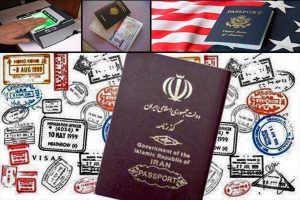April 11, 2017
By Peyman Pejman
- The number of interrogations or incarcerations of expatriates visiting Iran has increased.
- Few Iranian expatriates pay attention to travel advisories, travel warnings, and other related information published for their security benefit by governments such as the United States and United Kingdom.
- Iranian community organizations in various countries seem to do little in raising awareness to risks involved in going to Iran.
Attending a Council on Foreign Relations talk in the United States last September, Iran’s Foreign Minister Javad Zarif sent as clear a message as any Iranian official has to date to Iranian residents in or dual nationals of mainly Western countries.
 “Hundreds of thousands of Iranians, millions of Iranians, live outside Iran. Thousands of them, hundreds and thousands of them come to Iran on a regular basis and leave Iran on a regular basis without any impediment or any problem,” Zarif told the New York meeting.
“Hundreds of thousands of Iranians, millions of Iranians, live outside Iran. Thousands of them, hundreds and thousands of them come to Iran on a regular basis and leave Iran on a regular basis without any impediment or any problem,” Zarif told the New York meeting.
But, he added, “Unfortunately, something happens to some of them.”
That “something” is an increasing number of Iranians living in other countries, either as permanent resident or dual citizen, who return to Iran and are interrogated, forbidden to leave the country, or imprisoned on unverified charged.
When that happens, said the foreign minister, officials such as himself and President Hassan Rouhani, who are in favor of better relations with the West, cannot be counted on to gain their freedom because of what the minister called the independence of the judiciary in Iran.
The exact number of Iranian expatriates detained in Iran is not known. Iran often does not publicize such detentions and other countries, too, either do not know or do not want to publicize cases of their Iranian expatriates in trouble in Iran.
By latest count, there are at least a dozen Iranian permanent residents of dual nations of other countries currently lingering in Iranian jails. Those individuals are from the United States, United Kingdom, France, Sweden, and Canada. In addition to those, Iran is believed to be holding former U.S. Federal Bureau of investigation agent Robert Levinson and U.S. permanent resident of Lebanese origin Nizar Zikka, a computer technology specialist.

Earlier in April, Iran released Robin Reza Shahini, believed to be in his mid-40s, on a $60,000 bail. The Iranian-American was arrested in October 2015 while visiting family in Tehran. It is not clear whether he would be allowed to leave the country while released on bail.
The issue of Iranian expatriates being interrogated or imprisoned when returning to Iran for temporary visits is significant for at least two interrelated reasons.
First, the number of such interrogations or incarcerations has increased substantially in the past couple of years. Some analysts believe that is because of sharpening dynamics in Iran’s internal politics. As Iran’s “more moderate factions,” such as those symbolized by President Rouhani and Foreign Minister Zarif, have shown success in opening up the country to the West –as evidence by agreements such as the nuclear deal – the more “hard line” factions have resorted to detaining more Iranian expatriates returning to Iran.
“That the Iranian authorities are willing to hold a mother and baby hostage for domestic politics and as a bargaining chip in their international negotiations shows that they have reached a very dark place,” British Richard Ratcliffe, whose dual national wife, Nazanin, was arrested last year told reporters.
The detention and interrogation numbers have shown a considerable spike since Tehran signed the P5 + 1 nuclear deal with the United States, United Kingdom, Germany, France, Russia, and China. Iran has also released more such detainees, compared to previous years, particularly in the immediate aftermath of signing the deal.
Those familiar with the cases of some of those imprisoned in Iran have said the message from Iran is usually the same: the captors want Western governments to make political and economic concessions that they know they would not achieve through normal negotiations.
The second reason the issue merits more attention is that for various reasons, despite continuous attempts by governments such as the United States and United Kingdom, few Iranians seem to pay much attention to travel advisories, travel warnings, and other related information that are published for their security benefit. And Iranian community organizations in various countries, too, seem to do little in raising awareness to risks involved in going to Iran.
In the United States, for example, the Department of State’s Iran Country Specific Information, which includes a variety of information including travel advisories and warnings, received a paltry 74,071 visits in 2016. It could not be determined how many of those visitors were Americans with no ties to Iran who wanted tourist information and how many were Iranian-Americans or Iranians with permanent residency in the United States.
“For American tourists to Iran, they are much more likely to pay attention to our warnings,” a State Department official told Kayhan London, implying Iranians in the United States do not pay as much attention.
She said the State Department does not get many phone calls from Iranian dual citizens or permanent residents either. “I get occasional calls from people in America who have some kind of problem in Iran that they need to resolve, some kind of family problem that they want resolved without having to travel to Iran. But for people who have decided to go and need to go, they don’t generally call,” she added.
Since Iran and the United States do not have diplomatic relations, Switzerland protects U.S. interests in Iran. While Iran does not recognize dual nationality for its citizens, Iranian-Americans and green card holders can still reach out to the State Department, although the United States cannot offer help to green card holders if they face difficulties while in Iran.
The State Department says it does – and wants to do more – outreach to the Iranian-American community in the United States. The exact number, locations, and modalities of such outreach efforts in 2016 are not clear, in part because various State Department offices do their own events and often do not keep statistics that are then aggregated and analyzed.
Regardless of whether the State Department has done its share of getting information out or not, it is also a legitimate question why Iranians do not make better use of resources available to them to make more judicious travel decisions.
“Many [Iranians] take their freedom in the U.S. for granted and have become rather complacent,” said Zohreh Mizrahi, a California-based immigration lawyer who is involved with several Iranian-American organizations and has first—hand knowledge of Iranians who have faced difficulties in Iran.
“Iranians are used to talking to each other. It is more of a cultural issue. They are more persuaded and attuned to the advice of their family members than to checking the web sites and information that is issued by the U.S. government,” she added.
Why the aversion against government-provided information? Mizrahi said that, too, is cultural.
“The notion of the government being your protector and shield does not resonate with the Iranian culture and that’s because historically Iranians have learned not to trust their government,” she added. “[But] the Iranian community is becoming more engaged and proactive in communicating with the elected officials, participating in the process of local and national elections. The fact that many Iranians have children who were born and raised in the United States, they are learning more about it … I think it [the mindset] is changing.”
Another reason for the complacency might be that Iranian-American organizations have not capitalized on the recent detentions and interrogations of Iranians going back as a way of raising security awareness.
Kayhan London reached out to three major Iranian-American organizations –the Public Affairs Alliance of the Iranian Americans, the National Iranian American Council, and the Iranian American Bar Association — and asked if they had organized any outreach activities to discuss increased security risks for Iranians traveling back. None responded.
Former Iranian detainees might have their own reasons for wanting to remain silent.
“Many of them go through the trauma and even if it just questioning and no bodily harm, that emotional anxiety has taken a toll on them. Many times, after they are released, they are ordered and mandated to refrain from speaking in public about their experience in Iran,” said Mizrahi.
“They fear that if they speak out, the officials might go after them or after their families.”








